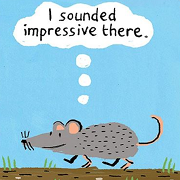|
Canine Blues Arooo posted:This analogy doesn't work the way you think it does. If 'unprotected sex with strangers' is 'eating anything and everything you want', then 'abstinence' is the equivalent to 'starve yourself to a sub-20 BMI!'. Sex-education that emphasizes appropriate protection is where you want to be and that is our 'portion control'. Not sure if you are purposely torturing the analogy or what, but this is really off base. He is not comparing the act of sex to eating food, he is comparing the attitude and educational (or lack thereof) approach. Abstinence only works in a perfect world where people do what they "should do" whereas comprehensive sex education accepts what people "actually do" and arms them with knowledge. In this case, people who just cite personal responsibility (what people "should do") are not contributing to better outcomes that require a more comprehensive, social solution that is based on what people "actually do." Note that this type of individual judgement based evangelizing plays well into the baser parts of human psychology (often treated as "common sense") and has been broadly adopted into classic liberal and modern conservative ideology. Why is why this analogy is even more apt.
|
|
|
|

|
| # ? May 29, 2024 23:21 |
|
MaxxBot posted:Dear god this website is even worse than I expected. Bring back GBS Tumblr thread.  The Larch posted:I'm not the one saying that things should be restricted based on deaths resulting from it. Answer the drat question. I can't, because this discussion doesn't involve enumerated rights in the first place. No rights are being restricted even if we went fully self-parodic and everyone was limited to 2000 calories a day (and we said gently caress bodybuilders as a consequence). Or did I miss the foodie amendment in the Bill of Rights? quote:Explain how your system prevents obesity-related deaths. I'm not seeing it. Make walking in public while above a certain BMI/body fat percentage (whatever point that obesity is defined as beginning at) a citeable offense no different than smoking the chronic/smoking anything on public property is in some cities like Los Angeles. More extreme cases that are clearly over the line will be cited most often because cops can eyeball those instantly but it'll establish an atmosphere that gives people an immediate motivation they don't have right now. Immediacy is the key. Death by eating yourself under the table is potentially decades down the road so that's obviously not getting the job done currently as stats and trends indicate. Look at people who smoke for proof of that. If you're going to say we can't do that because that'll especially suck for some people that's exactly why we should do it. That's how punishments work. It's not a punishment people will work to avoid if it doesn't suck. Millions dying sucks more than any bind this law would create. I'm sure we can have an exception to the BMI rule if you have a doctor's note that your body literally can't operate under a certain level of obesity for whatever reason. And that'll be rarer than hen's teeth in reality despite what HAES types would like to believe. e: I can't believe people are saying I hate people who aren't fitbros or I'm doing this for my boner. Overweight types aren't as attractive IMHO but the statistical risk and death isn't associated with it in the same way as obesity so I think that should be legal. 
DeusExMachinima fucked around with this message at 18:43 on Nov 26, 2015 |
|
|
|
DeusExMachinima posted:Bring back GBS Tumblr thread. Wow this is truth given to hyperbolic "nanny state" nonsense conservatives often spew. Also I have a very hard time seeing this as not violating the constitution as an undue breach into the personal realm.
|
|
|
|
Jarmak posted:Wow this is truth given to hyperbolic "nanny state" nonsense conservatives often spew. If hundreds of thousands or millions dying every year isn't cause for a state to exist, what is? As for the second part, drug laws (justified statistically or not) have been upheld in court so like I said--it's not an enumerated right. Which amendment, specifically, is being violated here and how? It's due because of mass death and it's not personal because it's not a personal right.
|
|
|
|
DeusExMachinima posted:If hundreds of thousands or millions dying every year isn't cause for a state to exist, what is? Those numbers are really irrelevant outside of context, dying to what, out of a population of how many? Its not the role of the state to force people to live their life to the utilitarian ideal, that's totalitarianism. These aren't drug laws, I'm not even sure what you're basis for comparison is there unless its literally "it goes in your mouth". There's half a century of iron clad precedent stating the government is required to stay the gently caress out of personal health decisions, as well as private personal matters in general. See: 1st, 3rd, 4th, and 9th amendments, Griswold v Connecticut, Roe v Wade, Lawrence v. Texas Jarmak fucked around with this message at 20:40 on Nov 26, 2015 |
|
|
|
Jarmak posted:Those numbers are really irrelevant outside of context, dying to what, out of a population of how many? Its not the role of the state to force people to live their life to the utilitarian ideal, that's totalitarianism. On the other hand even if the government tries to stay out of personal health decisions, a lot of its actions directly influence the health of the population anyways, especially on a communal level. One of the task would be to correct decades of bad urban planning.
|
|
|
|
Honj Steak posted:On the other hand even if the government tries to stay out of personal health decisions, a lot of its actions directly influence the health of the population anyways, especially on a communal level. One of the task would be to correct decades of bad urban planning. There's a world of difference between the government encouraging and facilitating healthy behavior, which is a good thing, and using the power of the state to enforce it.
|
|
|
|
DeusExMachinima posted:Make walking in public while above a certain BMI/body fat percentage (whatever point that obesity is defined as beginning at) a citeable offense no different than smoking the chronic/smoking anything on public property is in some cities like Los Angeles.
|
|
|
|
DeusExMachinima posted:Make walking in public while above a certain BMI/body fat percentage (whatever point that obesity is defined as beginning at) a citeable offense no different than smoking the chronic/smoking anything on public property is in some cities like Los Angeles. More extreme cases that are clearly over the line will be cited most often because cops can eyeball those instantly but it'll establish an atmosphere that gives people an immediate motivation they don't have right now. Immediacy is the key. Death by eating yourself under the table is potentially decades down the road so that's obviously not getting the job done currently as stats and trends indicate. Look at people who smoke for proof of that. So what I'm getting is that you completely lack any sort of mechanism to prevent people from becoming obese or to get people who are obese to stop being obese, meaning that you will not, in fact, reduce the obesity-related death rate one bit. Odds are you will increase it, as stigmatization causes people to avoid seeking professional help.
|
|
|
|
Jarmak posted:There's a world of difference between the government encouraging and facilitating healthy behavior, which is a good thing, and using the power of the state to enforce it. Definitely. The measures mention by DeusExMachinima sound rather fascistic.
|
|
|
|
ANIME AKBAR posted:To me the fundamental problem with regulations on "lovely food" is that there's no such thing as objectively lovely food. Not true. There's always fecal contamination. That makes for objectively and literally lovely food.
|
|
|
|
Honj Steak posted:Definitely. The measures mention by DeusExMachinima sound rather fascistic. Just what the prison industrial complex needs, overcrowded prisons now being overcrowded with oversized prisoners. Maybe we can just skip straight to weight loss Gulags. Maybe that'd be a better use for those FEMA camps that are totally planned by Obama to round up conservatives. DeusExMachina how much would you personally allow your taxes to increase to fund these defattification camps? Working out sets you free.
|
|
|
|
DeusExMachinima posted:Bring back GBS Tumblr thread. So an obese person gets constantly stopped and harassed by police with no way of avoiding it in the short term? You can't just stop being obese like you can not smoke in public dude. It's a long process. How are they going to buy healthy food if they can't leave their homes without being cited? How are they going to exercise? And now that they're criminals how are the rest of society going to treat them? Remembering that criminals getting raped in prison or murdered by police is just totally fine for a lot of the populace. When they get treated even more like poo poo and can't go outside to socialize how are they going to avoid being stressed out and/or depressed (which are both terrible for health)? This is a terrible idea.
|
|
|
|
Higsian posted:So an obese person gets constantly stopped and harassed by police with no way of avoiding it in the short term? You can't just stop being obese like you can not smoke in public dude. It's a long process. How are they going to buy healthy food if they can't leave their homes without being cited? How are they going to exercise? And now that they're criminals how are the rest of society going to treat them? Remembering that criminals getting raped in prison or murdered by police is just totally fine for a lot of the populace. When they get treated even more like poo poo and can't go outside to socialize how are they going to avoid being stressed out and/or depressed (which are both terrible for health)? A strong motivation not to get into a situation that causes death at rates that would make a genocidal operation proud, isn't it? Jarmak posted:Those numbers are really irrelevant outside of context, dying to what, out of a population of how many? Its not the role of the state to force people to live their life to the utilitarian ideal, that's totalitarianism. OK, let me drop the mask here. Pretend I bolded that whole thing. I totally agree with what you're saying Jarmak but just remember to apply this logic to every other public safety law and you're well on your way to joining the mostly libertarian team.  I think this thread is the most individual responsibility and personal freedom-ish I've heard DND ever be! I think this thread is the most individual responsibility and personal freedom-ish I've heard DND ever be!Also check my first post in this thread. Incredibly nobody called me out on my 180.
|
|
|
|
DeusExMachinima posted:Also check my first post in this thread. Incredibly nobody called me out on my 180. :puppetmaster: Views evolve, and you've tended to espouse extreme views in the past, it's hardly unlikely for you to swing away from civil liberties.
|
|
|
|
People seem to be ignoring the central question, which is, "Why do people overeat, and why have more people been doing so?" One aspect that has largely been ignored is that food is a source of pleasure the absolute majority of people are, no matter their working and living conditions, going to have access to. Not just stress eating, but eating as a source of enjoyment for people who have demanding lives and so can't engage in other pleasurable activities they enjoy. Thus, it may be that one of the more important factors is simply dysfunctional work-life balance and economic uncertainty, which in turn demands changes much more radical than any serious proposal.
|
|
|
|
|
DeusExMachinima posted:OK, let me drop the mask here. Pretend I bolded that whole thing. I totally agree with what you're saying Jarmak but just remember to apply this logic to every other public safety law and you're well on your way to joining the mostly libertarian team. What you were doing, or at least attempting to do, was blatantly obvious. You were just absolute garbage at it. e: I really can't understate how incredibly awful your attempt was. Like, if I was trying to create a strawman of someone trying to make your argument the way you were making it, I... probably would have actually made a better argument, to be honest. The Larch fucked around with this message at 04:03 on Nov 27, 2015 |
|
|
|
I say we're better off offering free lipo and excess skin cuttin' off procedures to the public if what we're concerned about is reducing the costs to the national budget of increased health care for the fat. I guess you'd also need to offer an allowance for new clothing that'll fit, or some sort of government tailor service. Arcane rules and police harassment seem like a way less efficient ways of achieving the ends of "way less people are very fat". And hey: the free lipo and excess skin removal procedures and their prep times are great times for other health checkup poo poo to be done as well!
|
|
|
|
Effectronica posted:People seem to be ignoring the central question, which is, "Why do people overeat, and why have more people been doing so?" I think it also has to do with other addiction rates declining. I'm guessing a lot of people who are obese would instead be heavy smokers if that were still socially acceptable (though, obviously, there's plenty of obese people who smoke, so it's not a complete explanation). The real question is why people gravitate to very calorie-dense food, too. I like a lovely, light tomato sauce as much as a much more calorie-dense alfredo, and it's not meaningfully less filling. How can we get people to adjust their tastes to enjoy vegetables as much as butter and cream?
|
|
|
|
You can't adjust tastes to enjoy bland or lightly seasoned vegetables as much as foods that are practically tailor made to appeal to our senses of taste and smell.
|
|
|
|
fishmech posted:You can't adjust tastes to enjoy bland or lightly seasoned vegetables as much as foods that are practically tailor made to appeal to our senses of taste and smell. So? Heavily season that poo poo. Garlic, shallots, basil, oregano, paprika, hot pepper, a reasonable helping of salt, etc. Way better than bland mass produced garbage. I'm not saying to combine a can of tomatoes and some cooked pasta or something.
|
|
|
|
PT6A posted:So? Heavily season that poo poo. Garlic, shallots, basil, oregano, paprika, hot pepper, a reasonable helping of salt, etc. Way better than bland mass produced garbage. I'm not saying to combine a can of tomatoes and some cooked pasta or something. The wrongest thing you can say is that the food most people overeat is bland. It tastes really good, that's why they eat so much of it, instead of other things they could afford for the same prices in similar quantity. Pretending something can't taste good just because it's common is sheer snobbery. Also just dumping spices and herbs on poo poo is rarely going to result in the kind of flavor people after buttery/creamy things want.
|
|
|
|
PT6A posted:So? Heavily season that poo poo. Garlic, shallots, basil, oregano, paprika, hot pepper, a reasonable helping of salt, etc. Way better than bland mass produced garbage. I'm not saying to combine a can of tomatoes and some cooked pasta or something. The worst food for you is poo poo produced by a master chef who isn't holding back, fat is delicious and that's just a biological constant you can't change.
|
|
|
|
Oh man I ate so much today
|
|
|
|
Jarmak posted:The worst food for you is poo poo produced by a master chef who isn't holding back, fat is delicious and that's just a biological constant you can't change. Yeah, on the other hand, I had a 24-course meal at a 2-Michelin-star restaurant when I was in Spain, and due to the timing and size of all the courses, it made me feel pleasantly full but didn't make me feel stuffed, and I doubt I gained much weight that day. Any master chef worth their salt isn't going to simply ply you with fat and garbage all night, because there's absolutely no art to it. And, yeah, when I was there, the jamón was good, but the fact that she made beets enjoyable for me for the first time was actually far more impressive and more satisfying.
|
|
|
|
I mean, we could focus on developing genuinely nutrition-free fat and sugar replacements that are also not potentially damaging to the body in high doses, and subsidize their production to the extent that they're cheaper than real fat and sugar, and figure out how to also make them roughage as well, such that people can overeat and be less fat. And we could also hope that this doesn't prompt even greater amounts of overeating that erase any gains. Seems ridiculous, though.
|
|
|
|
|
PT6A posted:Yeah, on the other hand, I had a 24-course meal at a 2-Michelin-star restaurant when I was in Spain, and due to the timing and size of all the courses, it made me feel pleasantly full but didn't make me feel stuffed, and I doubt I gained much weight that day. Any master chef worth their salt isn't going to simply ply you with fat and garbage all night, because there's absolutely no art to it. And, yeah, when I was there, the jamón was good, but the fact that she made beets enjoyable for me for the first time was actually far more impressive and more satisfying. Yeah on the other hand I bet you that meal was incredibly unhealthy and I wouldn't be surprised if those beets were cooked in fat. Like the idea that a master chef isn't going to ply you with fat unless they're deliberately trying to prepare something healthy is so ludicrous I have to assume you have no training whatsoever. Mediterranean trends better on the whole because it tends to favour healthy fats, but this comment is just mind blowing in the context of something like classical French
|
|
|
|
Honestly I think it helps to get into the headspace of healthy at any size people - their main motivation for acting the way they do, is because being fat is seen as a character flaw instead of a health problem. This naturally makes them defensive and lash out. Obviously their behavior is kinda funny and absurd, but their reactions aren't that unnatural. So, treat it as a public health problem. So bad news is that people are obviously going to keep chasing poo poo food, good news is that what taste good depends on context. If all the food you eat gradual reduces in sugar/fat content, you won't actually notice, and in fact in the UK This has already happened to trans-fat, and is being suggested for sugar. You gradually reduce the dose and people won't notice. Good stuff! Jarmak posted:Yeah on the other hand I bet you that meal was incredibly unhealthy and I wouldn't be surprised if those beets were cooked in fat.
|
|
|
|
From the New Yorker today, Teaching Grownups How To Eat. http://www.newyorker.com/books/page...=ODAyNDk1MTU2S0 It may be difficult to relearn how to eat as an adult, the British food historian Bee Wilson tells us in her book “First Bite,” but it is possible, and, in much of the developed world, it is necessary. Until the twentieth century, Japanese food was often neither delicious nor nourishing. Junichi Saga, a Japanese doctor who chronicled the memories of elderly villagers from just outside Tokyo, in the nineteen-seventies, found that, in the early years of the century, most families scraped by on a mixture of rice and barley, accompanied by small quantities of radish leaves, pickles, or miso. Animal protein was almost entirely absent in the Buddhist country, and even fish, as one of Saga’s informants recalled, was limited to “one salted salmon,” bought for the New Year’s celebrations, “though only after an awful fuss.” It wasn’t until after the Second World War, with the arrival of American food aid as well as new fishing and storage technologies, that Japanese cuisine became varied in both seasoning and substance. In the course of the twentieth century, consumption of grains in Japan fell by almost half, replaced by eggs, meat, fresh fruit and vegetables, and, most of all, fish. These new influences were incorporated into Japanese cuisine, adapted to fit traditional ideas about portion size and meal structure as well as traditional tastes for miso, soy, and pickled and fermented vegetables. By the nineteen-seventies, the country’s food culture had been utterly transformed. Today, Japan is one of the most food-obsessed countries in the world—the first perfect watermelon of the season sells at auction for more than two thousand dollars, and gourmet manga top best-seller lists—and yet it also has one of the lowest rates of obesity in the world. In her new book “First Bite,” an exploration of how individuals and cultures learn to eat, for better and for worse, the British food historian Bee Wilson cites Japan’s culinary history as an example of how dietary improvements can take place on a national scale. The lesson to draw from the Japanese, she argues, is not that the West must move to a sushi-based diet to tackle its obesity pandemic, no matter how delicious that sounds. Instead, Japan is an example of how eating habits, far from being “inevitable or innate,” can evolve remarkably quickly, even in places where healthy practices are lacking. “We often convince ourselves that there is something vital within us that prevents us from ever eating differently,” Wilson writes. But “if the Japanese can change, why can’t we?” Wilson—whose previous book, “Consider the Fork,” was a fascinating look at how kitchen utensils have shaped how and what we eat—often uses the topic of food as a gateway to explore the intersecting histories of ideas, culture, technology, and society. She’s written about the evolution of food fraud, the history of the sandwich, and humans’ relationship with bees. “First Bite” marks something of a shift in subject matter and approach: the book contains copious archival research, illuminating, for example, the history of school-food programs and eating disorders, but it also incorporates personal anecdotes from Wilson’s life: her troubled relationship with carbohydrates as a teen, and her desperate attempts to spoon healthful foods into the mouth of her resistant toddler son. Much of the book is concerned with how children learn to eat: Wilson explores the latest research on when to introduce solid food and the long history of government interventions in childhood nutrition, as well as how flavor preferences are imprinted or picky eating habits developed. Although she seems reluctant to preach (“No amount of urging from me to eat this or that food will make you eat it,” she writes), Wilson does have an agenda. It may be difficult to relearn how to eat as an adult, she tells us, but it is possible, and, in much of the developed world, it is necessary. After all, in America, at least, many adult diets remain stuck in an endless rotation of scaled-up favorites from the kids’ menu: more than half of all food ordered in restaurants consists of burgers, French fries, pizza, or Mexican food. As a nation, our intake of calories from vegetables has fallen by three per cent since the nineteen-seventies, which, as Wilson points out, “is a bigger drop than it sounds like,” since vegetables contain fewer calories than other food groups. Even more dispiritingly, five foods—iceberg lettuce, frozen potatoes, fresh potatoes, potato chips, and canned tomatoes—made up nearly half of those vegetable servings. With skyrocketing rates of obesity and diet-related diseases, a Japan-style transformation in the United States seems overdue. Obesity researchers and healthy-food advocates today offer a variety of suggestions for how to reform the American diet. Some, such as Adam Drenowski, the director of the Center for Public Health Nutrition at the University of Washington, blame the country’s poor eating habits on structural issues: economic inequality, an obesogenic environment, and a national agricultural policy that favors the production of calories over nutrients. Change, seen from this perspective, will only come about through government action. Others, such as the chef and activist Alice Waters, take a more didactic approach to food reform. If individual Americans were taught to grow and cook healthy food, she and others argue, they would learn to eat that way—and the country’s food system would shift to meet that demand. Yet another approach, perhaps best embodied by the now ubiquitous hundred-calorie “snack pack,” holds that the best way to change American eating habits is by stealth: redesigning packaging, grocery store layouts, and kitchen counters across the country to make it harder not to make healthy food choices. Wilson does not discount any of these solutions, but she is realistic about the barriers that stand in the way of systemic change. Established agribusinesses lobby against farm bill reform, supermarkets lose money when they remove candy from the checkout aisle, and low-income single parents working several jobs to make ends meet will struggle to find the time to cook dinner from scratch, whether they know how to or not. Wilson’s interest in “First Bite” lies in how the combined forces of culture, memory, and long-standing food preferences lead individuals to perpetuate the often unhealthy eating habits they’ve inherited. “Just because dietary change can happen on a national stage,” she writes, “does not make it easy to enact it at a personal level.” The key to lasting dietary change, according to Wilson, is “a hedonic shift” in attitudes toward food—a reorienting of our palates that would render broccoli at least as delicious as cookies. “When our preferences are in order,” she argues, “nutrition should take care of itself.” Better yet, the trick to learning to love cruciferous greens turns out to be relatively simple: repeated, positive exposure to broccoli and its cousins. To prove how malleable our palates can be, Wilson marshals an array of case studies and experiments that have examined the human ability to shape and reshape food preferences. Though our tastes can seem as hard-wired as eye color or blood type, evidence shows that genetics can account for only a small fraction of the variation in individual food likes and dislikes. Far more important are the pressures and cues we’re exposed to from the time we begin choosing what to eat. In an astonishing experiment conducted in Cleveland and Chicago in the nineteen-twenties and thirties, the pediatrician Clara Davis set out to explore what babies would choose to eat if freed from the expectations of their parents. At each meal, the subjects were presented with ten bowls of puréed foods. A team of nurses was trained to only scoop a spoonful of a food if the infant pointed toward a particular bowl, and to only put the spoon in the child’s mouth if the mouth was open. Children in Davis’s “eating-experiment orphanage” chose to eat liver, sour milk, and beets just as happily as they chose chicken and bananas. In another chapter, Wilson describes the simple technique that Keith Williams, the director of the Penn State Hershey Children’s Hospital Feeding Program, employs to expand the palates of extremely picky young eaters. Bite-sized servings of three or four new or “difficult” foods are placed on one plate, known and liked foods are served on a second plate, and the picky child is asked to take a bite from the first plate, and then from the second plate, moving back and forth between plates for ten minutes. This process is repeated several times a day, over the course of several days. For Tyler, a sixteen-year-old boy with Asperger syndrome who would only eat ham steak, cereal, and farfalle pasta, two weeks of this two-plate treatment resulted in the addition of seventy-eight different foods to his diet. Children, Wilson’s engaging journey through the research shows, are especially receptive to this kind of dietary exposure. But her larger point is that it’s never too late to change how we eat. In Sweden, an experimental “taste school for the elderly” managed, through repeated and enjoyable cooking and dining activities, to get a group of eighty-year-old men to not only try fennel and sweet potato for the first time but to actively choose to eat them. Being an omnivore does indeed pose its dilemmas, but its “wonderful secret,” Wilson writes, “is that we can adjust our desires, even late in the game.”
|
|
|
|
Phyzzle posted:Fortunately, we have simplified Nutrition labels to make that sort of thing easy. You know, it drives me crazy that DSV% is never listed for sugars. And Big Sugar wants to keep it that way.
|
|
|
|
The fact that people can learn to like new foods later in life is irrelevant. Sugar and fat still hit special buttons, and that happens no matter the culture. Even in Japan people are consuming more fast foods and sugared sodas. They just have extremely strong cultural and legal consequences for obesity that we don't: http://www.ibtimes.com/japan-has-many-problems-obesity-isnt-one-them-1038090 Also lol at reducing an entire nation's cuisine to "Mexican food? That's kids stuff, right?"
|
|
|
|
sweek0 posted:From the New Yorker today, Teaching Grownups How To Eat. TL;DR but here's my favorite part from a quick scan: quote:After all, in America, at least, many adult diets remain stuck in an endless rotation of scaled-up favorites from the kids’ menu: more than half of all food ordered in restaurants consists of burgers, French fries, pizza, or Mexican food. Food preferences can obviously change, but I'm not sure I buy Japan as a great example of change - yes, they ended up with a fine diet, but they transitioned from "a mixture of rice and barley, accompanied by small quantities of radish leaves, pickles, or miso" while first-worlders nowadays have as much of anything as they want to.
|
|
|
|
LeeMajors posted:You know, it drives me crazy that DSV% is never listed for sugars. And Big Sugar wants to keep it that way. It is also kind of stupid that sugar is measured in grams instead of teaspoons or a unit people actually measure sugar in.
|
|
|
|
Grams are a perfectly valid way to measure sugar though 
|
|
|
|
mobby_6kl posted:Grams are a perfectly valid way to measure sugar though Yeah, the units are fine--there's just no reason that sugar is ignored with %DSV. It lacks context that is applied to every other nutrient on the box.
|
|
|
|
Jarmak posted:Yeah on the other hand I bet you that meal was incredibly unhealthy and I wouldn't be surprised if those beets were cooked in fat. Of course there was fat involved in the preparation of those dishes, I'm just saying that it was a more balanced meal than going down to Applebee's or wherever. The poo poo that gets prepared in corporate kitchens is needlessly high in fat and sugar in a lot of cases, simply because it's easy to use those things to create a pleasing meal that can be prepared out of a bag by a trained ape. Even rich food prepared in the classical French tradition is more restrained in a lot of cases. (and the meal in question was Basque, not French -- appreciably lighter)
|
|
|
|
mobby_6kl posted:Grams are a perfectly valid way to measure sugar though No it isn't. There is a reason there are so many results from places like Michigan State on Google for "why is sugar measured in grams" with accompanying conversion guides. It should be listed in how you commonly measure it because there are a lot of people who can't comprehend how much sugar a gram is, but they know what a teaspoon is. E: the entire nutrition label needs an overhaul because sugar isn't the only thing wrong with it. Cole fucked around with this message at 15:25 on Nov 27, 2015 |
|
|
|
PT6A posted:Of course there was fat involved in the preparation of those dishes, I'm just saying that it was a more balanced meal than going down to Applebee's or wherever. The poo poo that gets prepared in corporate kitchens is needlessly high in fat and sugar in a lot of cases, simply because it's easy to use those things to create a pleasing meal that can be prepared out of a bag by a trained ape. Even rich food prepared in the classical French tradition is more restrained in a lot of cases. It's easier for someone with skill to cook delicious healthy food, and certain cuisines tend to be lower in fat, but you're trying generalize this into some sort of snobby bullshit about how plebe food is so much worse for you and you don't know what you're talking about. The fat being more varied or artfully handled does not make it less, and in my experience often makes it more because I/they know so much more they can do with fat then just dumping in butter. A master chef poaching something in duck fat isn't any more healthy then some high school kid dropping poo poo in the deep fryer at Applebees.
|
|
|
|
Why are we assuming dietary fat is unhealthy?
|
|
|
|

|
| # ? May 29, 2024 23:21 |
|
Cole posted:No it isn't. There is a reason there are so many results from places like Michigan State on Google for "why is sugar measured in grams" with accompanying conversion guides. america.txt
|
|
|





 This poster loves police brutality, but only when its against minorities!
This poster loves police brutality, but only when its against minorities!

















